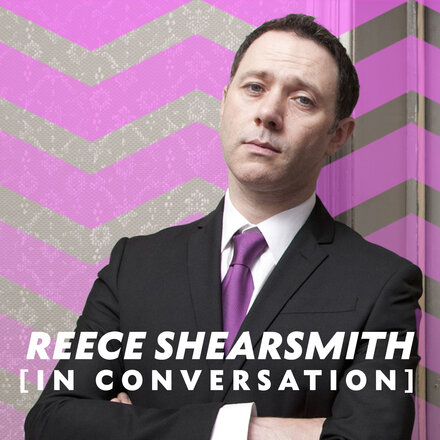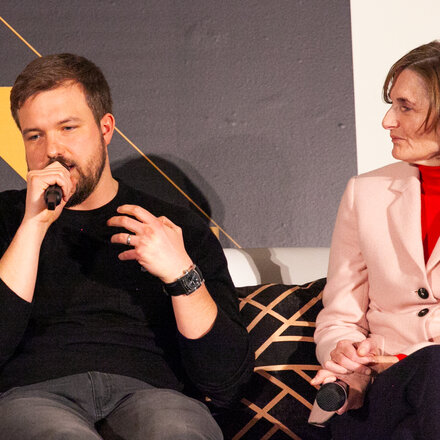
Jon Foster & James Lamont: Interview
They got their break writing a sketch for The Armstrong & Miller Show; now they’re BAFTA-winning writers for surreal comedy animation The Amazing Adventures of Gumball.
Words by Matthew Bell
Two days after picking up the Writer award at the Children’s BAFTAs, Jon Foster and James Lamont are struggling to contain their surprise. With next to no TV experience, the young writers beat some big names – the Horrible Histories writing team, Simon Nye for Just William and Phil Ford for The Sarah Jane Adventures – and the might of CBBC to the top prize.
The Amazing World of Gumball, which was created by French-born animator Ben Bocquelet, has built up a loyal following on Cartoon Network UK since it first aired earlier this year. Foster describes the show as a “family sitcom,” albeit a daft one. “The main character is a blue cat and his best friend is a goldfish with legs, and they’re in a class with a peanut, a banana and a T Rex,” he explains. “Gumball is a show with a lot of heart. You can make your characters do the stupidest things, but it has to have a beating heart if you want people to love it.”
Foster and Lamont have a performance background; both appeared on the Edinburgh fringe during their student days and later on the comedy circuit. It proved a tough but necessary baptism. “When you’re getting started, having a direct relationship with an audience is really useful. Discovering that a joke you thought was hysterical when you wrote it doesn’t resonate with anyone, and then learning how to change it to make it work on night two is great training,” says Lamont.
The duo met while working as a researcher (Foster) and editor (Lamont) at Johnny Vaughan’s company, World’s End, and were soon writing and filming online videos together. “We had such a good time that they ended up having to split us up like naughty classmates,” recalls Foster.
Their TV break came when they sold one of their sketches, featuring the patronising ex-pat Doctor Tia, to BBC1’s The Armstrong and Miller Show. “People are more open than you’d think to new ideas and new writers. Ben and Alexander have to do a lot of characters and sketches and they’re always going to need ideas. It isn’t a closed shop or on old boys network that you can’t get into,” says Foster.
"If you want to be a writer, write. It’s very easy to want to be a writer; it’s much harder to do it."
With the first sniff of success, the budding writers had to buckle down. “You can write to entertain yourselves until the cows come home, but when you’re given a brief by a serious TV show you have to work for those characters,” says Foster. “Getting commissioned is only the first thing; you’ve then got to convince them to keep the sketches in the show.”
Like many comedy writers, they work as a team. “Comedy requires an audience. If your audience is the person who you also find funny and trust instinctively, then if he laughs at your joke, that joke is probably funny. If he doesn’t laugh, then I also have to trust his judgment. You have to put the script first and your egos to one side,” says Foster.
Surely, there must be some tensions? “Not so far. We’re constantly in each other’s company either in the office or online. We write over Skype a lot so we get to sit in our houses in our pants during the day,” says Lamont.
“It’s really helpful for both of us to be able to see what each other’s typing. I’m a hopeless dyslexic and while I’m writing a paragraph, Jon will be correcting it simultaneously. We work on every gag together and we’re not happy until we’re sure they’re right.”
“You have to like hanging out with each other,” adds Foster. “You don’t want to spend every hour of your working day and often most of your weekends with someone you don’t like. We even like going out drinking together.”
And, of course, the shoulder of your partner is there to lean on when the inevitable ‘Thanks, but no thanks’ letters arrive. “It’s something you have to get used to as a writer, no matter how many shows you’ve written, no matter how well they’ve done, you’ll still get loads of rejections. Having a good friend helps at those times,” says Foster.
Hard work is paying off for the writing duo, who are currently penning series two of Gumball and have other projects in development. They may only be in the early stages of what seems likely to be a long career, but do they have any tips for wannabe writers?
“Work hard. If you keep enjoying it, keep doing it. And, if you’re good at it, one day somebody will pay you to do it,” says Foster. Lamont, though, adds a note of caution: “If you want to be a writer, write. It’s very easy to want to be a writer; it’s much harder to do it.”






